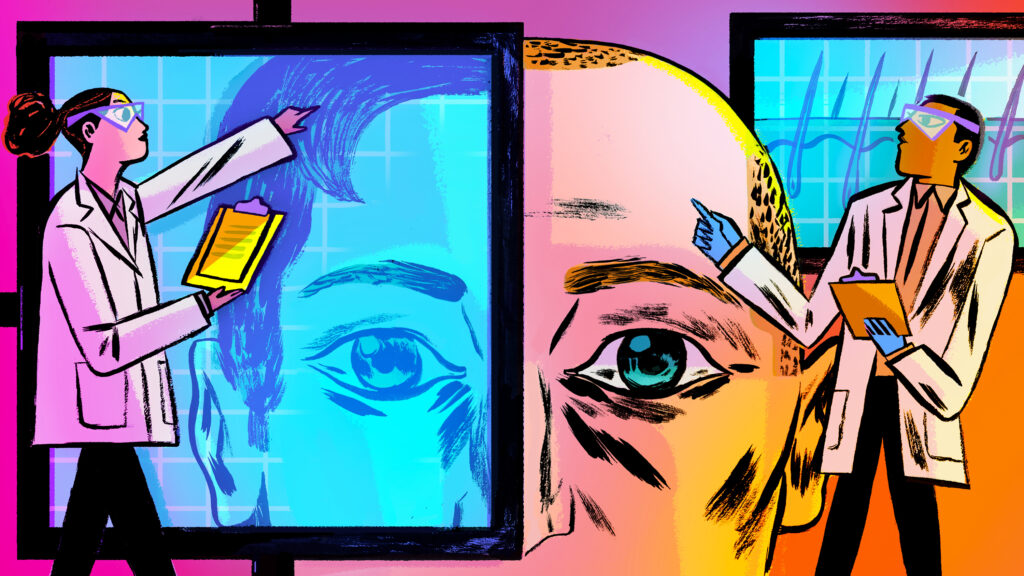Science
Biotech Investors Fuel New Hair Loss Treatments with $270M Funding

Biotech investors have shifted their focus recently, directing significant resources toward innovative hair loss treatments. Last month, two startups, Pelage Pharmaceuticals and Veradermics, successfully raised a combined $270 million to develop therapies targeting androgenetic alopecia, a prevalent form of hair loss. This marks a notable change in investor interest, which has typically centered on more traditional sectors such as oncology and artificial intelligence.
Cathy Friedman, an executive venture partner at GV, initially dismissed the prospect of investing in hair loss solutions. She expressed skepticism about the efficacy of such treatments, often perceived as mere “lotions and potions” with little scientific backing. “We’re like, ‘I’m sorry, we’re GV. We do, like, science-based companies. We don’t do crazy hair loss [ventures],’” she explained.
However, Pelage’s approach, which involves a novel stem cell therapy aimed at reactivating dormant hair follicles, ultimately convinced Friedman and her team. This innovative strategy could potentially offer a more scientifically grounded solution to hair loss, appealing to both investors and consumers seeking effective treatments.
Shifting Perspectives on Hair Loss Treatments
The enthusiasm surrounding these recent investments illustrates a growing recognition of the potential market for hair restoration therapies. Androgenetic alopecia affects millions globally, creating a demand for effective treatments. While traditional options like minoxidil and finasteride have been available for years, many consumers remain dissatisfied with their results, prompting interest in new advancements.
Pelage Pharmaceuticals is pioneering a treatment based on stem cell technology. This therapy aims to stimulate hair growth by reinvigorating hair follicles that have stopped producing hair. The company’s approach has garnered attention not only for its innovative method but also for the potential to revolutionize the hair loss treatment landscape.
Veradermics, another player in this burgeoning sector, is similarly focused on developing effective solutions for hair loss. The influx of funding reflects a broader trend within the biotech industry, where investors are increasingly willing to explore unconventional avenues for potential breakthroughs.
Market Implications and Future Outlook
The combined $270 million investment into Pelage and Veradermics underscores a significant pivot in funding strategies among biotech investors. As competition intensifies, these startups will face the challenge of not only proving the effectiveness of their treatments but also navigating the rigorous regulatory landscape typical of medical therapies.
Looking ahead, the success of these companies could pave the way for more substantial investments in hair loss treatments. If clinical trials demonstrate the efficacy of their therapies, it may inspire confidence among investors who have historically overlooked this sector.
The growing interest in hair restoration treatments reflects not just a shift in investor sentiment but also an increasing societal focus on personal appearance and well-being. As the market evolves, both Pelage and Veradermics are positioned to play a pivotal role in shaping the future of hair loss therapies, potentially transforming the landscape for individuals affected by this common condition.
-

 Technology4 months ago
Technology4 months agoDiscover the Top 10 Calorie Counting Apps of 2025
-

 Health2 months ago
Health2 months agoBella Hadid Shares Health Update After Treatment for Lyme Disease
-

 Health3 months ago
Health3 months agoErin Bates Shares Recovery Update Following Sepsis Complications
-

 Technology4 weeks ago
Technology4 weeks agoDiscover 2025’s Top GPUs for Exceptional 4K Gaming Performance
-

 Technology2 months ago
Technology2 months agoElectric Moto Influencer Surronster Arrested in Tijuana
-

 Technology4 months ago
Technology4 months agoDiscover How to Reverse Image Search Using ChatGPT Effortlessly
-

 Technology4 months ago
Technology4 months agoMeta Initiates $60B AI Data Center Expansion, Starting in Ohio
-

 Technology4 months ago
Technology4 months agoRecovering a Suspended TikTok Account: A Step-by-Step Guide
-

 Health4 months ago
Health4 months agoTested: Rab Firewall Mountain Jacket Survives Harsh Conditions
-

 Lifestyle4 months ago
Lifestyle4 months agoBelton Family Reunites After Daughter Survives Hill Country Floods
-

 Technology3 months ago
Technology3 months agoUncovering the Top Five Most Challenging Motorcycles to Ride
-

 Technology4 months ago
Technology4 months agoHarmonic Launches AI Chatbot App to Transform Mathematical Reasoning








